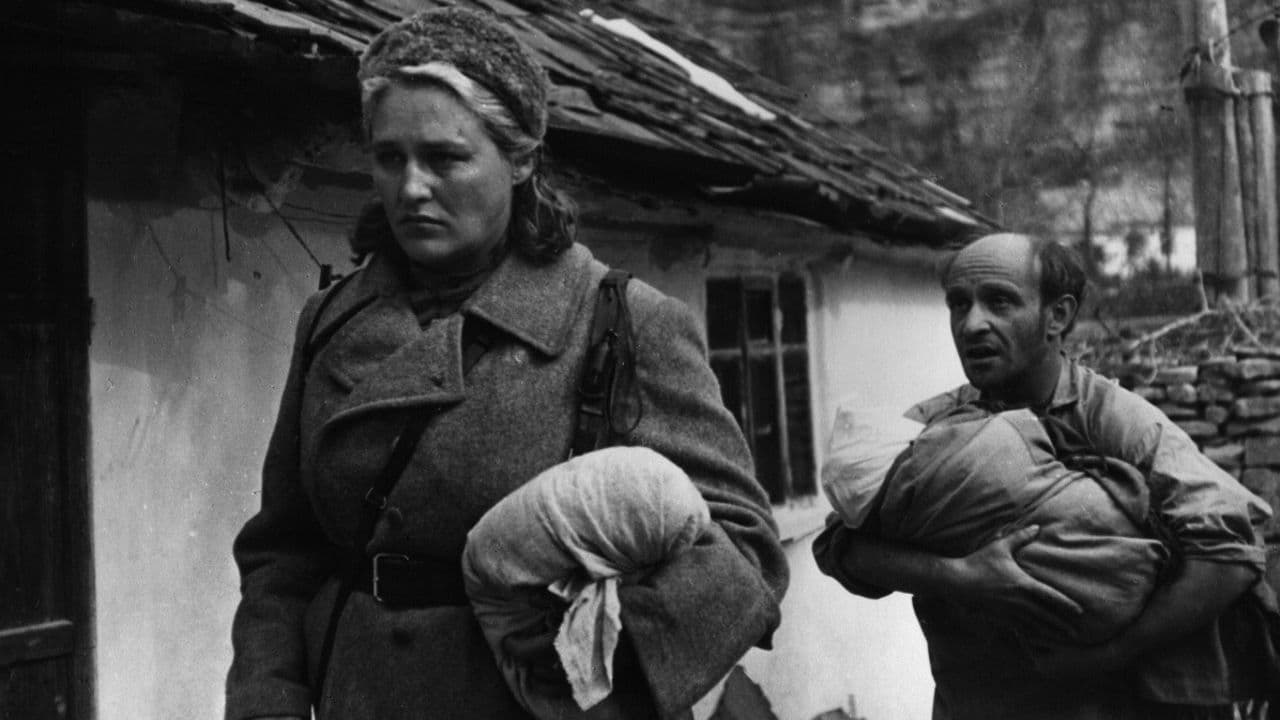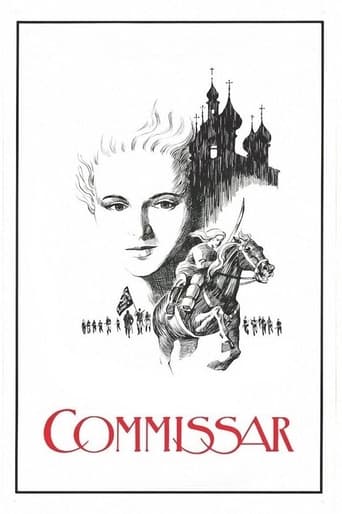

After watching a movie, "Tsirk", that featured Jewish actors executed, it was nice to see a more positive spirit towards the chosen people. The movie, which features a Red soldier go into hiding during Civil War to have a child, is noticeable for the sympathetic depiction of the Jewish family that takes her into their home. Likewise the female officer is at once a tough, professional, militant figure who naturally takes on maternal duties when she feels her child's life is in danger.Of all the scenes in the movie the one featuring the daughter on the swing stood out. We see these children being so cruel to her as she calls out for an absent mother, and we in the audience understand helplessness. The fact that it is drawn out so long only makes us want to comfort her more.A very real, painful movie that features an ending so shocking that I did not believe that it was really over.
... View MoreAdapted from Vasiliy Grossman's novel, "Komissar" (called "The Commissar" in English) was banned for twenty years in the Soviet Union; the censorship board considered it "pro-Zionist" due to its sympathetic portrayal of Jews. It portrays pregnant commissar Klavdia Vavilova (Nonna Mordyukova) staying with an impoverished Jewish family during the 1918-21 civil war. This is the sort of movie that shows the lives of forgotten people in the midst of world events; the father Yefim (Rolan Bykov) complains of how things have not really improved for the Jews since the revolution. I would say that that's something that historians should note.As an FYI, the woman who is teaching the Russian cinema class here in Lewis & Clark College was at the premiere of "The Commissar" in Moscow in 1987.
... View MoreOne of the reasons that Commissar was initially banned in the Soviet Union was the use of religious imagery in the film. One example of this is shortly after Vavilova, the Commissar, has her baby. She walks by a graveyard, and the Russian Orthodox crosses are prominently featured in the shot. This can be interpreted to mean that Vavilova was forced to carry the baby, which she initially considers a burden, in the same manner that Christ had to carry His cross. It could also symbolize the idea of a life cycle, where Vavilova just had a child and is then seen at the cemetery, where she is surrounded by death. Another instance where crosses appear in the film was when Vavilova, Yefim (the father of the Jewish family she is forced to stay with), and his family were boarding up the windows and doors to prepare for the White Army soldiers that were coming. In one shot, Yefim is nailing a beam across a window, perpendicular to another board which clearly makes the shape of a cross.The other major example of religion that can be found in the film is when Vavilova travels to the priest, and then to where the synagogue had been. She does this in order to have her baby baptized, or recognized in the Jewish religion. This would not have sat well with Soviet censors, seeing a strong female Commissar traveling in search of someone to baptize her child. I found this scene particularly moving because it seemed that Vavilova simply asked the priest for directions, and would rather have had her baby brought up to be Jewish. This shows the positive impact that Yefim and his family had on Vavilova during her stay.
... View MoreI saw "Komissar" as part of a local Jewish Film Festival. It is a black and white film that focuses on a commander on the Red side of the Russian Civil War, Klavdia Vavilova, who finds herself pregnant with the baby's father dead in battle. Unable to continue the fight, she is thrust upon a poor Ukranian Jewish family, who are told to provide her lodging.The family takes her in (what choice do they have?) but soon their heart-felt sharing and kindness become obvious. When the Reds are retreating in a White advance, the danger is clear - were Klavdia found out by the Whites and identified as a Red komissar, the whole family could be executed. On the other hand, as the husband, Yefim Mahazannik, resignedly and clearly describes, the Jewish community can't expect good treatment from any Russian government at the time. In any case, the family asks her to stay, whether the village is under Red or White control.The story is stark, as can be expected from the setting. I enjoyed the performance of Raisa Nedashkovskaya, playing the role of the wife, Maria (isn't this much more a Catholic name than a Jewish one?). Her cheerfulness and kindness provide a welcome reprieve from the grimness of the film, as does, to some extent, her husband Yefim's incongruous singing. Even Maria and Yefim's children are forced to grow up quickly; I found disturbing their play-acting of the military harassing and killing Jewish people.I was surprised when the film ended; to me it was sudden and missing at least one or more final scenes. (I understand that the original 1967 film was actually not finished till the 1980s or 1990s. Apparently, the film was also banned in the former Soviet Union until Glasnost.) "Komissar" leaves one with silence and not hope for the Russian Jewish peasants and laborers, or any kind of vision of a peaceful and productive future for anybody.I did enjoy the skillfully subtle camera angles and landscapes. The actors gave strong and convincing performances. I also appreciated that the film could have justified being quite violent, but instead left most of the violence suggested and not graphic. Overall, I'd give the film a rating of 5 out of 10 - neither good nor bad, giving a good and perhaps realistic view into this period of history, but lacking a stronger plot.
... View More